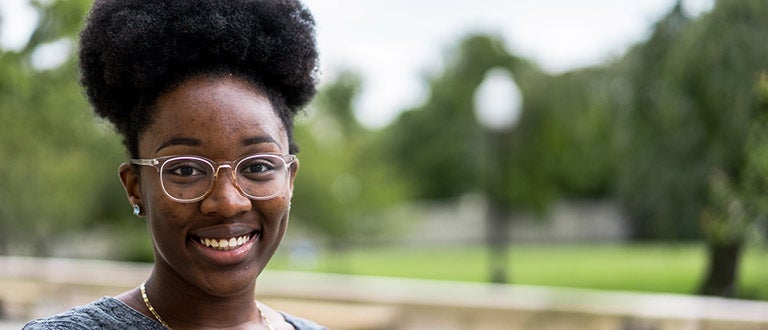Anyanwu Takes Aim at Health Gaps

Cristeen Anyanwu (C’18) was one of the summer term recipients of the Scott MacPherson Stapleton Award, which provides financial support for anthropology students to pursue unpaid internships, volunteer work or independent research.
(Photo: Alex Hu/Georgetown College)
October 12, 2016 — The field of anthropology is more often associated with history books and demographic studies than public health work. But this past summer, Cristeen Anyanwu (C’18) used some of her anthropological training to make a direct impact on the health of underserved communities in the D.C. area.
Anyanwu was a summer term recipient of the Scott MacPherson Stapleton Award. Named for a 2005 Edmund A. Walsh School of Foreign Service graduate who passed away in a traffic accident just before beginning graduate studies in anthropology at the London School of Economics and Political Science, the Stapleton Award is a grant administered to two anthropology students each semester to facilitate “intellectual and curiosity and rigor, as well as citizenship in our greater world.”
Anyanwu used her Stapleton Award to cover expenses of living in D.C. while volunteering at Georgetown Lombardi’s Capital Breast Care Center (CBCC) this past summer.
Though she intended to major in international health when she first arrived on the Hilltop, learning about public health helped Anyanwu realize that she really wanted to study and work with people. Still fascinated by public health and seeking a social justice-driven focus, she declared a major in justice and peace studies (with a concentration in health disparities) and a minor in anthropology.
Before long, the Maryland native realized that she could use lessons from her new field to make a difference locally. She began volunteer work at the CBCC, which provides women with breast cancer education and screening services to women in the area regardless of ability to pay.
“I think it’s really important to have an anthropological approach when it comes to eliminating health disparities,” Anyanwu said. “You have to understand how people frame things in their own mind, in their own context.”
Anyanwu volunteered at health education events and helped distribute materials for underserved communities, teaching women about proper preventative measures, self-examination techniques, terminology, and common myths about breast cancer.
“That’s the most important thing — education, health literacy, breaking down difficult language into everyday use,” she said.
The rising junior noted that the most striking thing about translating her classroom work into actual community engagement was the realization that her approach needed to take into account the busy everyday lives of the people she aimed to help.
“They’re people taking care of their parents, dealing with unemployment, their kid might be sick,” Anyanwu said. “You have to take into account their health, but you also have to take into account their social interactions and the other obligations that they have.”
Anyanwu’s work with the CBCC didn’t end when classes started back up: Summer Stapleton Award recipients are expected to bring some of what they learned in their summer experience back to the Hilltop. She’s helped to plan a panel on cancer disparities, aiming to educate people on the ways cancer affects different populations.
“In certain wards, there’s a high morbidity rate for African American women diagnosed with breast cancer — they’re more likely to die than their white counterparts,” she said. “That really revved me up personally, as an African American woman.”
Anyanwu explained that she wants to raise awareness of social determinants of health, and how they aren’t always as apparent as many observers think.
“We take into account income level, educational level, but we don’t take into account every environmental factor — if they’re living near a waste plant, for example.”
The panel, taking place this Friday in Healy 103, will feature Georgetown epidemiologist Dr. Lucile Adams-Campbell, National Cancer Institute biologist Dr. John Ojeifo and George Washington cancer institute program director Dr. Mandi Pratt-Chapman.
Anyanwu now hopes to take more classes on public health, focusing on health disparities and challenging assumptions about how we address disease.
“When someone’s sick and they take Tylenol, you don’t blame Tylenol for them getting sick. But a lot of the time, we see medical care or medical access as Tylenol, without recognizing the causes of the illness in the first place,” she said, paraphrasing a lesson she had learned in her health studies class. “So I’m looking at housing, looking at transportation, looking at how they live life and how that affects their burden of disease.”
— Patrick Curran
For more information about the Stapleton Awards, including past winners and the work of Anyanwu’s fellow summer term recipient Becca Yates, visit the award homepage. To learn more about health disparities, stop by the Cancer Health Disparities Panel this Friday, October 15, from 6-8 p.m. in Healy 103.